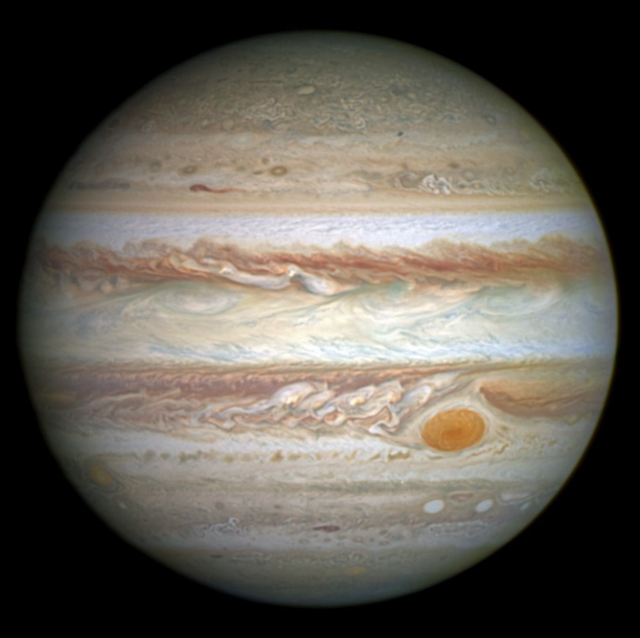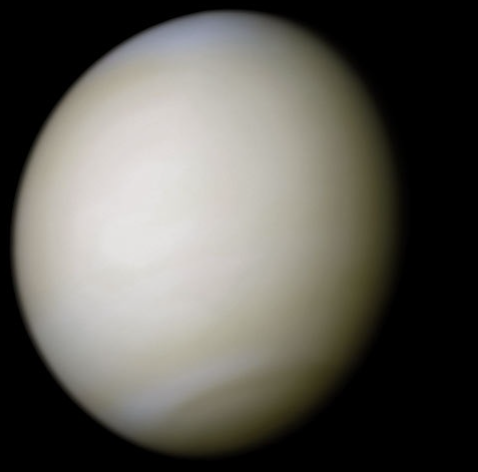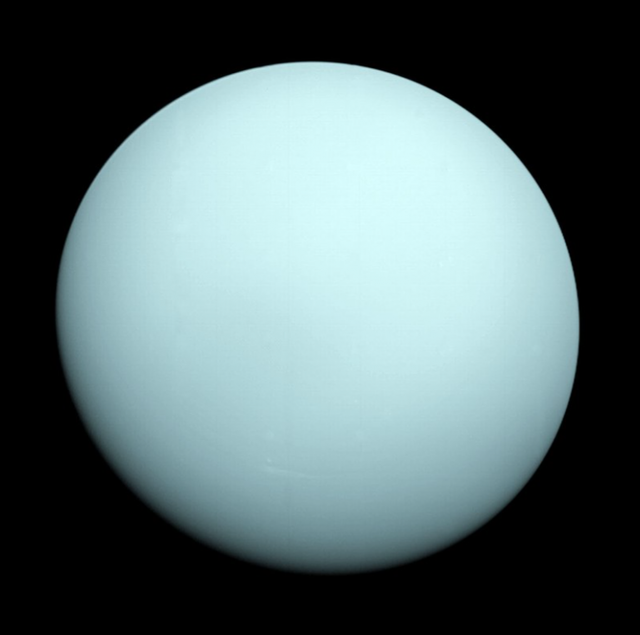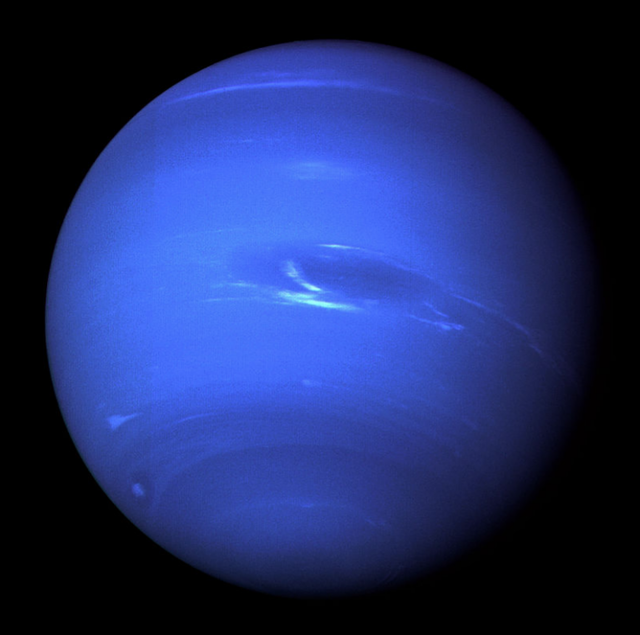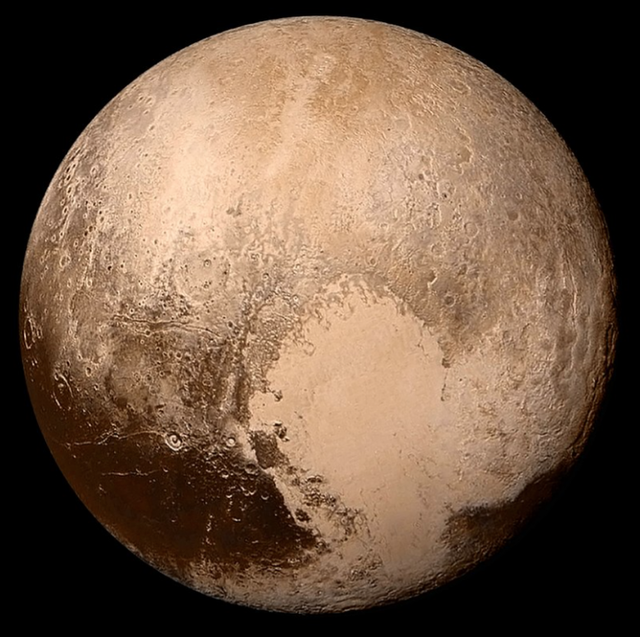The reason for the odd naming of the planets(Part:iii)
Jupiter (Jupiter)
Full-screen view of Jupiter in natural color in April 2014
It is the largest planet in our solar system. Jupiter or Jupiter will be 2.5 times more than the total mass of all planets.
The word Jupiter is very well-known since ancient times. Throughout history, you can find this name in the context of various events. The Romans named the Jupiter planet after the name of 'Jupiter' as the god of the Roman gods or goddess of gods. Which was called 'The king of Gods and thunder' He was also called the thunderbolt deity. According to Greek mythology, he is again known as 'Zeus / Zeus' who is called 'The father of all God and men, The ruler of Olympia'. The name of this planet, named after the most powerful and powerful god, is certainly not surprising.
Venus (Venus)
A real-color image of Venus taken by Mariner 10
processed from two filters. The surface is obscured
by thick sulfuric acid clouds.
Venus or Venus is one of the five planets visible in the eyes. It means that the ancient people knew very well about Venus and could see its direction in the sky quite well. At the distance it is the second nearest planet to the Sun. In the sky we see the brightest star that is named Sirius. But Venus or Venus is 10 times more brighter than it is. The cloud of Venus reflects the light of the sun like a giant mirror! This means that the Venus of bright or beauty can be found in this Venus.
Venus is named after the Roman goddess who is named after Venus, who is known as 'The Goddess of Love' (in Greek, Aphrodite). The ancient Babylonians called the brightest planet 'Ishtar', which is the name of one of their goddesses. She was 'The Goddess of Womanhood and Love' or symbol of femininity and love. But in the end, astronomers named the planet under the name of Venus Devi.
Till the Hellenistic period, ancient Egyptians and Greeks thought Venus or Venus as two planets, who would come together gradually in the morning and night. But at one point, they were able to understand that they were able to see the planets differently at different times.
Uranus
Uranus as a featureless disc, photographed by Voyager 2 in 1986
The English astronomer Harschelle's telescope was first found to be Nebula and later Comet's fault, but later this solar system was discovered.
Since he lived in England, he decided to name the planet after the name of his patron King George III. He thought the first name was 'Georgium Sidus' (according to Latin, George's Star or George Star). But the name was quite familiar in Britain, and the International Astronomical Committee did not express any interest. They show interest in choosing Greek or Roman mythology as the name of other planets.
In 1782, keeping the consistent consistency, Bud proposed to name the planet 'Uranus' (in Latin, Ouranos).
Uranus was called 'The God of Sky' or the god of the sky. He was the grandfather of Greek god Zeus, grandfather or grandfather. Who did Zeus remember? He is known as Roman Goddess Jupiter, whose name is named after Jupiter. Uranus was also the father of the father (in Greek 'Kronos' and in' Roman 'Saturn'). This planet was written in 1784 with a book titled 'From the Newly Discovered Planet'.
Neptune
Neptune's Great Dark Spot and its companion bright smudge; on the
west limb the fast moving bright feature called scooter and the little
dark spot are visible. Image credit: Nasa.
Shortly after the discovery, Neptune was referred to simply as 'Uranus outer planets' or 'Plan of Le Verrier'. The first advice from a name came from Johann Gale, who proposed the name of the januah. Another proposal was Oceanus. The planet's inventor Urbain Le Verrier His name is Neptune. Soon Neptune became the internationally adopted name.
In the Roman mythology, Neptune was 'The God of Sea' (in Greek, Poseidon or Poseidon). The name "Neptune" for this planet is used today in most languages. Neptune satellites were named after Poseidon's lover and relatives.
Pluto
Full-disk view of Pluto in near-true color, imaged by New Horizons
Astronomer Clyde W. Tombawah receives a snapshot of the planet for the first time in the Loll Observatory in Flagstaff, Arizona, in February 1930. At this time the planet was known only as "Planet X or Planet X", but it quickly became an issue of vivid discussion among the public and astronomical communities.
Then on the 14th of October in the same year, the former librarian of the Oxford University Library, Madan, was reading a newspaper feeding his 11-year-old granddaughter, VENSEY Barney, for breakfast and reading about the discovery of the granddaughter. Madan said with concern, 'What is the name of this planet called?' Venecie said, 'Why is not it named Pluto?' Because it is a distant planets, because the deity Pluto was also known as the god of death or the goddess of Patalipura and the god of the underground or the dark.
While looking at the black black spots on Pluto, Vensei did not make a mistake to name it. The Greek name 'Thees' or 'The God of Death and underworld' was well-known in the Puranas. Pluto is called a dark planet because of the same reason. So naming is quite true to me
